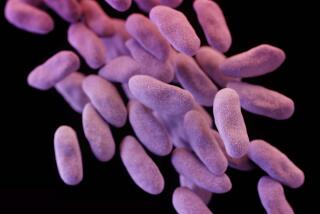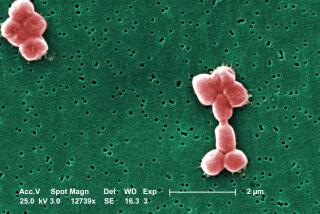New Advance in an Old War
- Share via
Call them lowly, but every day bacteria prove themselves clever and dangerous invaders of our homes, food and bodies. Deception is their game and they play it well.
Salmonella, for instance, evades the immune system by cloaking itself in chemicals that appear friendly to human defenses, unlocks cell doors and then releases the poisons that allow it to propagate. That makes 2 million to 4 million Americans very, very sick each year.
According to a new General Accounting Office report, bacteria are also now evading our most potent antibiotics at unprecedented levels. That’s why a UC Santa Barbara discovery announced earlier this month is so significant. Professors Michael J. Mahan, Robert L. Sinsheimer and David A. Low, along with graduate student Douglas M. Heithoff, disclosed they have been able to disable the cloaking mechanisms used by salmonella and other bacteria by stripping them of a particular gene.
Today’s antibiotics kill bacteria but also encourage the emergence of antibiotic-resistant bacteria. The UC discovery helps pave the way for vaccines that, by crippling rather than killing bacteria, discourage the swift emergence of drug-resistant strains.
The discovery should prompt Washington to reconsider how it doles out scientific research dollars. Congress is now considering a request from the Centers for Disease Control for an increase in its budget for fighting bacteria and other microbes that have become drug-resistant. The money would increase from $2 million to $14 million. Legislators struggling to make a 10% cut in the Labor-Health and Human Services budget that funds the centers are under heavy pressure to deny the agency’s request. The UC discovery underscores why they should resist the pressure.
Genetic engineering techniques developed in the 1980s and microscopic imaging machines crafted in the 1990s have permitted scientists at UC and elsewhere to discover that bacteria contribute to heart disease, ulcers and other maladies that only a few years ago were not seen as infectious diseases. Federal science funding, however, hasn’t taken the new knowledge into account yet. Epidemiologists, for instance, need more funding to study the roles bacteria might play in causing regional outbreaks of ulcers and heart disease.
Biologists have made huge strides in fighting bacteria, but the UC Santa Barbara researchers--some of whom boldly predict that their techniques could conquer bacteria altogether--should not underestimate their opponents. Having used mutations to evade foes for eons, bacteria have more experience than we do.






